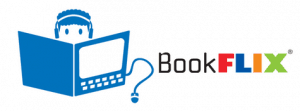calsfoundation@cals.org
Uncovering the Secrets of Family History: Our Free Workshop with an Ancestry.com Expert
Annual Genealogy Workshop brought gasps of surprise, cries of discovery
“I want to show you how many people are buried under this headstone.”
The speaker clicked to the next slide. An audible gasp arose from several hundred people as onscreen cemetery records revealed a single plot stuffed with 17 inhabitants.

The overstuffed gravesite was only one of many moments of revelation for the crowd that filled the Ron Robinson Theater on July 21. The CALS Butler Center’s Genealogy Workshop with Ancestry.com’s expert, Juliana Szucs, was by all reports a great success, offering helpful strategies for both beginning and advanced seekers of family history.
Hidden treasures for history detectives
Ms. Szucs introduced the audience to hidden treasures on Ancestry.com, the chief online resource for building family trees, searching for family history, or even seeking living relatives.
“I travel to these events to let people know that there are a lot of ways to find that missing family member in your past,” Ms. Szucs said. “People think they have come to the end of the line when their hints are gone, but there’s so much you can do with the other records we have online.”
The wealth of information online became clear as Szucs presented resources such as FindaGrave.com with images of headstones and records, African-American newspapers, passenger lists, Native American records and many more. The sheer number and variety of documents was astounding, especially when most can be seen with just the click of a button.
These records can be priceless to those whose own records are scanty or nonexistent: immigrants, people subjected to slavery or ethnic relocation, migrants across state lines, or those whose ancestors changed their surnames.
Finding long-lost connections with strangers
Family history research events can produce dramatic or funny discoveries, and this free CALS Butler Center workshop had its share.
When an excited cry of “My great aunt!” echoed across the auditorium, we had to go find out the rest of the story. It turns out that Jayne S. (left) and Martha C. (right) had never met. After striking up a conversation about Jayne’s t-shirt, the two discovered that Jayne’s mother was named after Martha’s great aunt!
Jayne said, “Martha asked me about my t-shirt for DAR (Daughters of the American Revolution) and said that her mother had been a member. I asked her if she had any relatives in Cleveland County, and from there we figured out the connection.”
A shared interest, with laughs on the side
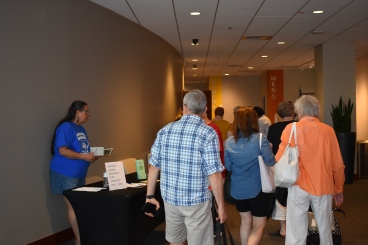 Michael P. and Rae-Lene W. had a funny story about why they were at the workshop. The two friends both have family stories that imply Native American ancestry, so they challenged each other to take the Ancestry DNA test and find out for certain who had more Native American genes. The answer: no one. Zero percent Native American. All those family legends were just fun stories, on both sides!
Michael P. and Rae-Lene W. had a funny story about why they were at the workshop. The two friends both have family stories that imply Native American ancestry, so they challenged each other to take the Ancestry DNA test and find out for certain who had more Native American genes. The answer: no one. Zero percent Native American. All those family legends were just fun stories, on both sides!
But the challenge spurred the two friends to learn more about their family trees. Rae-Lene said, “I have an ancestor who was orphaned in Eastern Europe, so now I have the World subscription to Ancestry.com. This workshop was very helpful. And I come to the Butler Center all the time.”
More than a list of names: it’s our personal story
Presenter Juliana Szucs emphasized that “we don’t look for family history to find a list of names. What we’re really seeking is our stories. We want to know who these people from our past were, and what they wanted from life.”
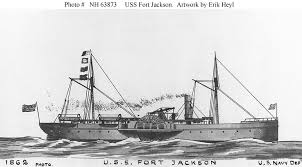 Ms. Szucs told a couple of anecdotes from her own research to show the real interest and power of family history. By using FindaGrave.com, she found out that her great-great-grandfather had served as a fireman on the USS Fort Jackson after enlisting in the Navy for the Civil War. Ms. Szucs would never have known about his military service, because as she later discovered, he enlisted under a false name in order to avoid discovery by his pregnant wife. His wife didn’t find out that her husband had enlisted until someone told her at the last minute that he was in the Navy shipyard, about to depart, and she had better come say goodbye. We can only imagine that dramatic scene.
Ms. Szucs told a couple of anecdotes from her own research to show the real interest and power of family history. By using FindaGrave.com, she found out that her great-great-grandfather had served as a fireman on the USS Fort Jackson after enlisting in the Navy for the Civil War. Ms. Szucs would never have known about his military service, because as she later discovered, he enlisted under a false name in order to avoid discovery by his pregnant wife. His wife didn’t find out that her husband had enlisted until someone told her at the last minute that he was in the Navy shipyard, about to depart, and she had better come say goodbye. We can only imagine that dramatic scene.
In other cases, family name changes reveal a family’s trials or hardships. Ms. Szucs showed records for Jan Mekalski, who changed his name to “Wagner” in the early twentieth century to avoid anti-Polish prejudice. Unfortunately for “Jan Wagner,” World War I broke out within a few years, and Jan had to change his name back to “Jan Mekalski” because of rising prejudice toward Germans due to the war.
 These name changes may seem extreme, but animosity toward various European immigrant groups could be so intense in the early 20th century that people could not get jobs to support their families if they belonged to the wrong ethnic group. In some cases, members of despised groups were publicly reviled or beaten. Knowing about Jan Mekalski’s name changes tells his descendants that this was a man who survived considerable prejudice and hardship.
These name changes may seem extreme, but animosity toward various European immigrant groups could be so intense in the early 20th century that people could not get jobs to support their families if they belonged to the wrong ethnic group. In some cases, members of despised groups were publicly reviled or beaten. Knowing about Jan Mekalski’s name changes tells his descendants that this was a man who survived considerable prejudice and hardship.
Jan’s name changes also show the culture of the time Jan lived in, which reveals our shared national history as well as personal history. In fact, the greatest lesson of genealogy research may be that the distinction between personal and national history is a false one. Our national history IS our personal history.
American history is our personal history
Ms. Szucs told a story over lunch that underlined the same lesson. When asked what had been her favorite project for Ancestry.com in her many years working there, she said, “Maybe the Declaration Descendants commercial.”
“In one month, we identified 149 living descendants of signers of the Declaration of Independence. It was a very diverse group,” Ms. Szucs said, referring to the striking ethnic diversity in the 60-second commercial.
“I worked on finding a lot of Ben Franklin’s descendants. Many of the descendants of the signers knew they were descendants and had heirlooms in the family. Some had no idea and were completely amazed. When they all got together, they felt a real connection because they were all related to a signer. They were exchanging contact information,” Ms. Szucs said.
Individual attendees find helpful tips, further assistance
Workshop attendees were seeking answers to their own heritage questions, and they universally agreed that the material from Ms. Szucs was helpful at all levels, for beginners and for experts.
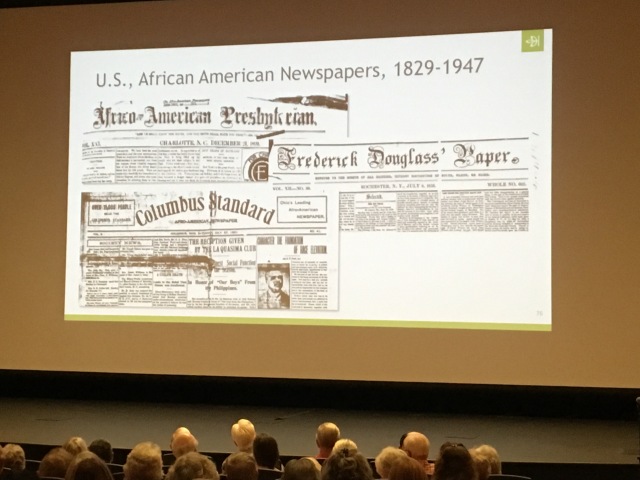
Kim P., who has been researching for a few years on Ancestry, is planning to continue her family history search, in part by seeking the help of the Butler Center’s resident expert. Genealogist Rhonda Stewart is skilled in tracing African-American ancestry through fragmented records. Kim described her own challenge in that area, saying, “My great-great grandmother shows up on the 1850 Census, but I couldn’t find her before or after. Her children are listed as “mulatto” and no father’s name is recorded.”
Attendee Wendy W., who is planning to become a professional genealogist, chuckled as she described her father-in-law’s hopes for her research. “His greatest dream was that I would find a criminal or outlaw in our family line, like Billy the Kid.”
Wendy has larger goals, however, having achieved her genealogy certification from Boston University. Though she noted that genealogists can work in many fields like criminal justice or law, she would like to use her work to reunite families.
More workshops and help available at the Butler Center
Representatives of local family history societies and clubs had informational displays at the workshop. Mary Evans of Heritage Seekers encouraged attendees to come to the Heritage Seekers Research Day at the Butler Center on July 28, open from 10am to 4pm. The group regularly holds research days by meeting together in the Butler Center’s Research Room. There, members with years of experience volunteer to help newcomers trace their family histories and find missing information.
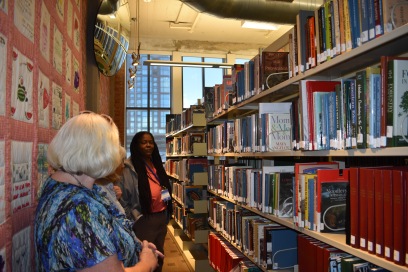 Another good resource to help those new to family research get started is a monthly introductory workshop by the Butler Center’s genealogist Rhonda Stewart, titled “Finding Family Facts.”
Another good resource to help those new to family research get started is a monthly introductory workshop by the Butler Center’s genealogist Rhonda Stewart, titled “Finding Family Facts.”
This CALS Butler Center offering will next take place on August 13 from 3:30pm to 5:00 pm on the 2nd floor of the Butler Center at the Roberts Library, 401 President Clinton Ave. Ms. Stewart gives both an overview of research strategies and a tour of the resources in the collection.
The CALS Butler Center offers a major genealogy workshop free of charge annually. We would like to thank this year’s speaker, Juliana Szucs, who is a genealogist and senior community manager for Ancestry.com, where she has worked for over twenty years. She contributed the “Computers and Technology” chapter of The Source: A Guidebook of American Genealogy and has authored many other genealogy articles. Szucs holds a certificate from Boston University’s online Genealogical Research Program.



